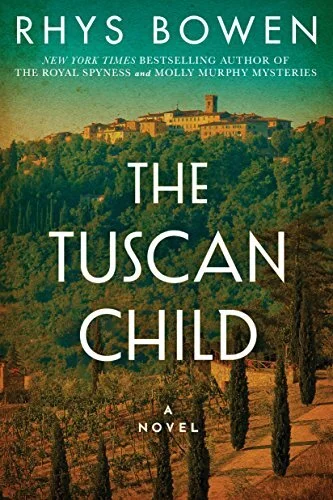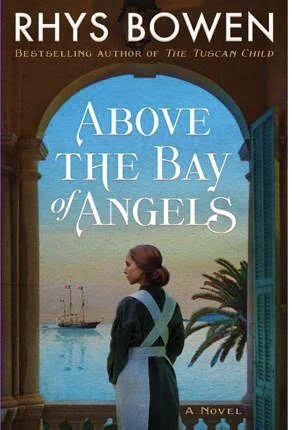Only write what you are passionate about not what you think can sell. By the time it is finished and submitted the trend will have moved on anyway.
Historic mystery novelist Rhys Bowen believes in writing the story that you yearn to write. She began writing commercially at the age of 22, transitioning along the way from popular children's author to mystery novelist and becoming a best-seller. We catch up to talk about pen names, daily word count goals and her research process.
Please give us a brief overview of yourself and your work
I am a New York Times, USA Today and #1 Kindle bestselling author of two mystery series and several historical stand-alone novels. I currently write the Royal Spyness Mysteries set in 1930s England and featuring a penniless minor royal, as well as The Tuscan Child and other historical novels. I have written 45 novels under the Rhys Bowen name to date and they are translated into 26 languages. I was born and raised in the UK, worked for the BBC in London and have been a professional writer since I was 22.
I currently divide my time between Northern California and Arizona. I am married with four wonderful children and five adorable grandchildren and love to travel, sing, hike and play my Celtic harp.
What made you want to be an author?
I didn’t want to be an author. I always was one. I lived in a world of make-believe as a small child, told stories, wrote poems and sold my first play to the BBC when I was 22. My mind is always full of ideas I need to write about, which is why I now enjoy stand alone novels so much. I can visit so many times and places!
You currently write two historical mystery series. What do you think is the key ingredient for writing a compelling historical mystery?
My aim is not to tell someone about a particular historical period but to take the reader there. I want the reader to feel they ARE in 1920 or 1901—the sights, smells, sounds all bringing that world to life. And any good historical has to be accurate. It may be fiction but it must be real! I think the success of my books is writing characters that the reader can identify with, even if they lived one hundred years ago.
Why do you write under a pen name?
I had been writing children’s and YA books and my agent felt I would be pre-judged if I wrote adult novels under the same name. So I chose my Welsh grandfather’s name as my first series was set in Wales.
Do you have a writing routine?
I write two books a year. It’s a full-time job. I get up, make some tea and get to work every morning. I have to write the first draft in three months which means 1500 words a day, so I sit at that chair until those words are done. Some days it’s easy, other days it’s really hard but if you know you can’t leave until you write the day’s quota, it gets done. After the first draft, I go through the whole book editing and refining. Then I give it to a couple of trusted readers and go through it once more refining.
I should add that the bulk of the research is done before I ever start writing. Visiting sites and reading background biographies.
How do you outline your work and begin writing?
I never outline. If I did that I’d be bored by the time came to write the book. I usually know where a book will be set. I’ve done my background research, visited the place, taken lots of notes. But I don’t often know exactly what will happen in the story. I know that Lady Georgie will go to Kensington Palace for a royal wedding and someone will die, involving the royal family in scandal. Or that a British airman will crash in Tuscany and years later leave behind a letter containing a secret. Then I start writing and the characters take off on their own and I follow. The secret is creating real characters!
Do you have any tips for a productive writing day?
As I said above, give yourself a quota for the day. Sometimes it feels like all bad, but the next day it doesn’t look so bad after all.
Is there any particular incident that has happened along your writing journey that you’d like to share?
Don’t believe bad reviews! For In Farleigh Field I have had over 5000 reviews on Amazon. Naturally, some are bad. But one said I know nothing about Britain, nothing about the upper class or how they speak. Actually, I am married to one. We spend our summers in a 14th Century manor house owned by his sister and the nearby cousin is called Sir Ferrers Vyvyan! My husband was so angry that he was determined to find out who wrote the review and hunt them down to tell them the truth!
Do you have any advice for aspiring authors?
First, read a lot in the genre you want to write in. I can’t tell you how many people want to write mystery having only read Agatha Christie. You need to know your field. Only write what you are passionate about not what you think can sell. By the time it is finished and submitted the trend will have moved on anyway. And lastly put on the board above your desk NOTHING IS WRITTEN IN STONE. Be prepared to discard even your all-time favorite scene if it doesn’t further the story.
What do you think is the biggest challenge for new authors?
These days it’s finding an agent. Most publishers won’t accept un-agented manuscripts.
What methods of book marketing do you find the most effective?
I connect with my fans on Facebook, Instagram, Twitter, newsletter. But I’m lucky as my publisher does most of the actual marketing.
What is the best writing advice you have received?
Believe in yourself. I wrote the proposal for In Farleigh Field because I wanted to write about WWII as it meant a lot to me, and neither of my publishers wanted to touch it. They said it was too far from my “brand”. My agent believed in it, sold it to Lake Union and it has sold almost half a million copies, was nominated for four awards and won three of them!
Find out more about Rhys Bowen’s books via her website and social media channels: Facebook, Instagram, and Twitter. She also blogs as part of the writing group Jungle Red Writers.











